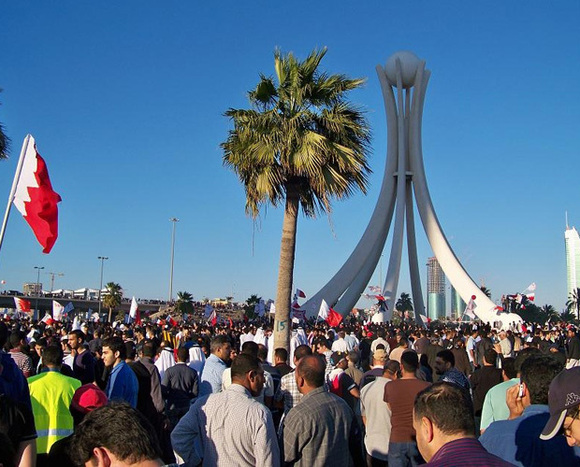Protests rise as Bahrain marks uprising anniversary
Taieb Mahjoub
DUBAI, Taieb Mahjoub- Bahraini police clashed with protesters on Monday, witnesses said, as the public security chief warned citizens not to heed calls by activists to mark the first anniversary of a Shiite-led uprising.
One year after month-long pro-democracy protests, the Gulf kingdom is at a political impasse, with Shiite protesters back on the streets despite a deadly crackdown by the ruling Sunni dynasty.

The interior ministry said that the main Shiite opposition group, Al-Wefaq, had been authorised to hold a demonstration but the rally had become "no longer peaceful."
Police were dealing with protesters who hurled petrol bombs at security forces, the ministry said.
The Coalition of the Youth of February 14th Revolution had urged sympathisers to march to Manama to commemorate the first anniversary of the uprising that was brutally crushed.
"Down with (King) Hamad!" protesters chanted.
Opposition groups in a joint statement called the police reaction "hysterical," saying security forces attacked women and children and clerics "who were badly beaten."
In a warning to activists on the eve of Tuesday's anniversary, public security chief Major General Tariq al-Hassan cautioned Bahrainis "not to respond to the inciting calls on (online) social networks to demonstrate."
In a statement published on the official BNA news agency, Hassan said the security forces would not hesitate to respond to "those that want to take advantage... to carry out unlawful, irresponsible acts that threaten public order."
Hassan said the government "will prevent" such actions, but also appealed to citizens not to "escalate tensions," adding that police have already bolstered security.
Activists have called for demonstrations on Monday and Tuesday at the former Pearl Square.
But the Al-Wefaq-led alliance of opposition groups said in a statement that although Pearl Square has "become a symbol" for protest, it is not the only one.
"All squares and streets of the country are sites that we use to renew our vows to press ahead in our struggle to achieve our demands," including a powerful parliament, representative government and redrawn "fair" electoral constituencies, it said.
The opposition groups insisted that the peaceful aspect of the movement "is a strategy of the opposition, not a temporary tactic," and rejected being drawn into confrontation.
Thousands on Sunday heard Al-Wefaq leader cleric Ali Salman call for "a political solution" to the crisis, saying this would be possible only after the release "of all political prisoners" and major political reforms.
Fears are mounting of further unrest.
"It is difficult to predict what will happen in the coming days in Bahrain because of the diversity and fragmentation of political forces and a disturbing division between Shiites and Sunnis," Bahraini analyst Ali Fakhro told AFP.
Amnesty International said the government "remains far from delivering the human rights changes" recommended by the Bahrain Independent Commission of Inquiry (BICI).
Despite several announcements claiming progress, "the fact is that it has still not delivered in the most important areas," said Hassiba Hadj Sahraoui, Amnesty deputy director for the Middle East and North Africa.
"Victims and families of victims of the serious human rights violations... are still waiting for justice," she added.
Amnesty also urged action to release protester Zainab al-Khawaja after she was arrested on Sunday while trying to march to Pearl Square. Khawaja was also detained for several days in December after taking part in a sit in.
EU foreign affairs chief Catherine Ashton on Monday urged "calm and restraint," and said it is "indispensable" that the recommendations of the BICI report are implemented.
The death toll from last year's unrest was 35, including five security personnel and five detainees tortured to death while in custody, the BICI report said last November.
But Amnesty said "at least a further 20 have died since" in protests because of the continued use of excessive force by security personnel.
King Hamad has acknowledged the conclusions of the BICI report but the authorities "did not act with seriousness to implement the recommendations of the committee," Al-Wefaq's Salman said earlier this month.
Mansour al-Jamri, editor of the independent Bahraini daily Al-Wasat, lamented: "The authorities have essentially opted for the security solution, which has led to the current impasse and the resumption of large-scale protests.
"A year later and we're back to square one. The crisis could escalate unless the authorities come up with a positive initiative" to revive dialogue.
--------------------------------------------------------------------------------------------